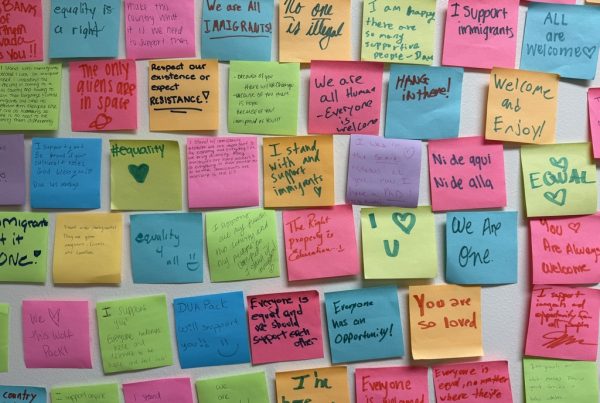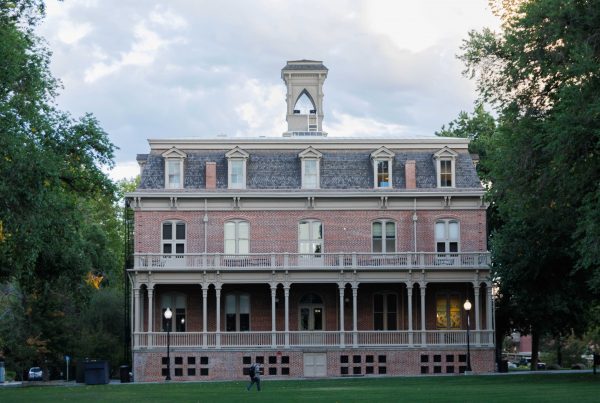Originally written by Jaedyn Young for Vibrant Voices Fall 2023 Magazine. This story has been edited to follow The Nevada Sagebrush style guide.

The Nevada Legal Services office can be found in this building at 449 S. Virginia Street on floor three.
When you enter college, the line between “adult-ism” and childhood is blurred. It’s the first time you’re on your own, but you’re also being thrown into the deep end of independent living.
For most incoming students, it’s a wreck.
Simple, first-time mistakes can lead to big-time consequences for students, especially when they start sliding into signing contractual agreements for housing.
Most big, corporate-owned renting properties around the University of Nevada, Reno campus have no connection to the University and seem to have the most issues in relation to student living.
As students get older and obtain more housing experience, students realize they need to thoroughly read their lease and understand what obligations and rights they have. However, as a fresh adult, many students might not know this.
Nicole Zachary, a student at the University of Nevada, Reno, thought she knew what she was getting into during her stay at an apartment complex near campus.
Zachary said that she was just grateful to have her own room in her own place. She had no idea what kind of situation she had got herself into.
“I didn’t even think of the ways that I was being taken advantage of,” Zacahry wrote in an email.
And how would she? Zachary was just looking for a single room to rent out at an off-campus sight near the university.
She found an apartment with the competitive price of about $800 a month with utilities and rental insurance included — a place she could afford to live at while still going to school full-time. It was reasonable and she had no issues with it at the beginning.
However, when a new management team was put in charge in 2021, she said things started to go downhill for her.
According to Zachary, there were allegedly slow changes overtime: an extra $45 monthly parking fee for residents, separate utility fees capped at $65 instead of included in the rent, plus a hiked-up rent fee, from $770 to $925.
Zachary said constant payment hikes made it much harder for her to afford living while still going to school.
“The [new] management group illuminated my eyes at how students are treated,” Zachary wrote. “[Student] have no fallback for housing once they are locked into a contract. Many of us work either part-time jobs, do work-study, or live off of our school loans to attend school and these people know that … It’s a lot of stress and responsibility placed on a young person so it seems easier to just give in to higher rent fees or utility charges.”
“Many of us have no second option,” she added, which is a true statement for most tenants who get roped into a contractual lease agreement.
If a tenant ends up disliking their housing situation and wants to get out of it, there are usually stipulations in the lease that require you to pay the landlord extra fees.
“The lease matters,” Rhea Gertken, the deputy director at Nevada Legal Services said. “When you have a written contract, that controls … As a general principle, if you want something and the landlord has agreed to it, it’s got to be in writing. If it’s not in writing, you have no way to enforce that.”
The tenant has to decide whether certain circumstances of the lease are suitable for them or not before signing. Tenants can try to negotiate, but if they disagree with the lease, Gertken says they must decide whether they are going to accept it still or find a different residence.
“You have to read [the lease],” Gertken said. “Read it before you sign it.”
Gertken gave a list of common things she recommended tenants to really look into before they sign their lease:
- Look at repair requirements. Occasionally, tenants will be burdened with small repairs up to a certain amount, so it’s important to look at what you’re required to fix.
- Look for early termination fees. Terminating a lease early could mean extra fees since the landlord has to put the property back on the market fast, so pay attention in case something comes up that may require you to break it early.
- Look for hidden fees. For example, sewer, trash and water fees may be added on top of the rent fee and late fees may be charged, but only up to five percent of your rent.
“Make sure you understand what your actual housing burden cost is,” Gertken said.
Habitability is another common issue besides leases that Gertken said Nevada Legal Services handles a lot, since it’s actionable if a landlord isn’t taking care of a property.
“Habitability is a legal term,” Gertken said, “There are things that the landlord is required to provide … We are talking about serious deficiencies in the unit.”
There are certain standards according to the Nevada law, NRS 118A, section 290, that tells you specifically the requirements for what is considered a habitual “dwelling unit” when you move in.
Gertken reminds tenants that if there is a case they are unsure about or a landlord is doing something unlawful, they have a brochure on their website to see where they can get help or advice with their situation.
“If we’re talking discrimination, definitely talk to the Silver State Fair Housing Council,” Gertken said. “They’re a great resource for anyone who might be experiencing discrimination or harassment in housing.”
Since Gertken said some things may be harder to understand with the NRS 118A, she encourages people to look through other resources like their website if students need help parsing through the statutes.
Gertken reminds people that if you are a disabled person looking for reasonable accommodation, there are a lot of protections to look into from the federal Fair Housing Act.
Unfortunately for Zachary, she also had to deal with one of her roommates allowing another person to move in their room. This seems to be a common thing with students, since many try to fit multiple people in a room to weasel out of high rent fees.
“This person began wandering the shared spaces at night, using our items and food and left a generally weird vibe in the house because we could never tell if they were home or not,” Zachary said.
She reached out to the management and someone came to their door to speak with the roommate who had the person living with her. From there, management told the roommate that the person must be out in a week or she would be charged a full month’s rent.
“That did not happen,” Zachary said. “For seven months, this person lived in the house and continued to use our stuff and make myself and the third roommate uncomfortable. I sent in forms, emails, and in-person visits to the office to ask for help but nothing ever happened.”
When Zachary moved out in December 2022, she had a new person relet her room. The apartment complex had allegedly charged both her and the girl reletting a full month’s rent as a fee and an extra month’s rent for moving out. Zachary tried to set up multiple forms of communication to get rid of this deposit. The management allegedly called Zachary two months after she moved out to pay another $300 and threatened to call collections.
“It severely depleted my funds for my new place, and I still haven’t recovered from that loss of income or that experience,” Zachary said. “I haven’t talked to many other people about my experience because of how embarrassing it was. I felt as though it fell on me for having chosen that rental and my continued action of resigning my lease each time.”
This is a common feeling for students who may not understand what they are protected from under tenant laws and contracts.
“For this problem to begin to be solved, high-volume college student towns need to put some protections in place for young [tenants],” Zachary added. “Many kids go straight to college from their parents and sign a contract without really understanding what it includes. We need more transparent contracts, more freedom to end contracts when leaving school or taking a leave of absence, and having to go home …”
Before students get to the point of needing legal services, a good idea would be to turn to the Nevada Legal Services website for general advice or resources to help them with housing issues. Since it’s grant-funded and generally for assisting low-income community members, the organization will ask for income and asset information from all clients. Depending on their available funds, students could potentially be helped further if they fit the criteria.
Jaedyn Young can be reached at jaedynyoung@sagebrush.unr.edu or on Twitter @jaedyn_young3.







